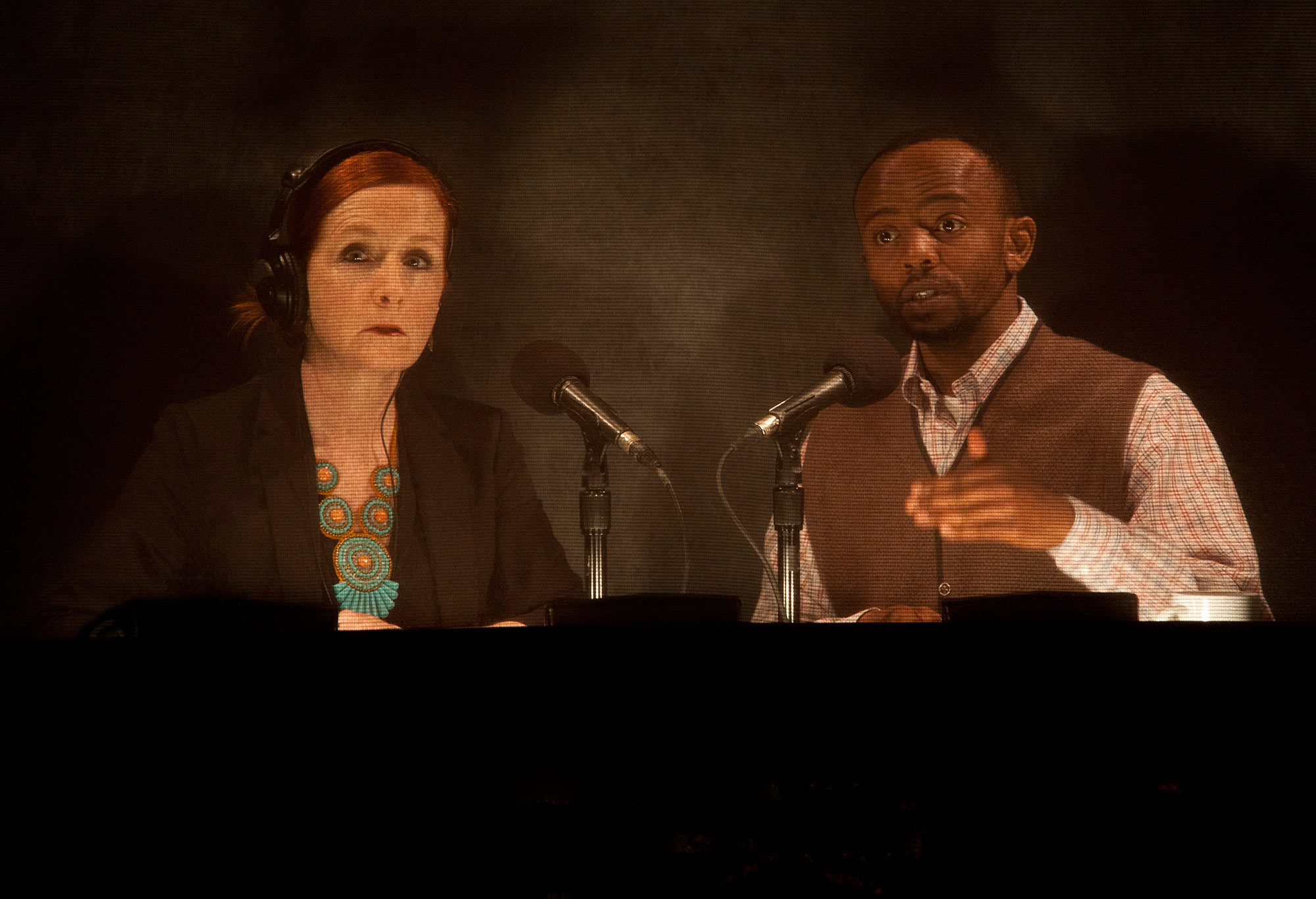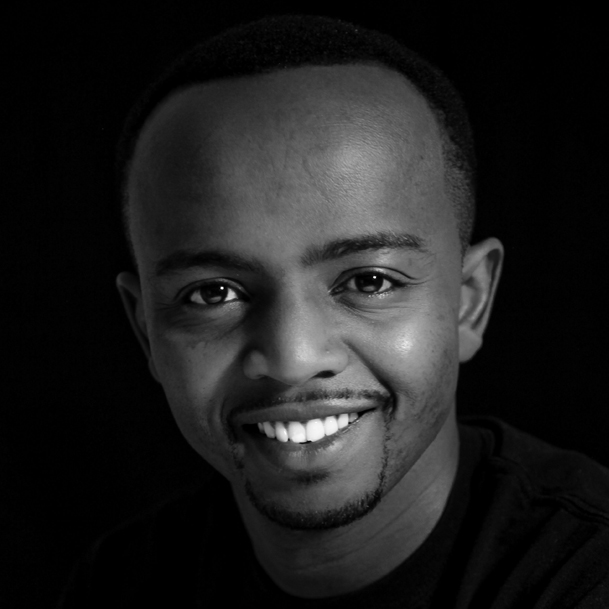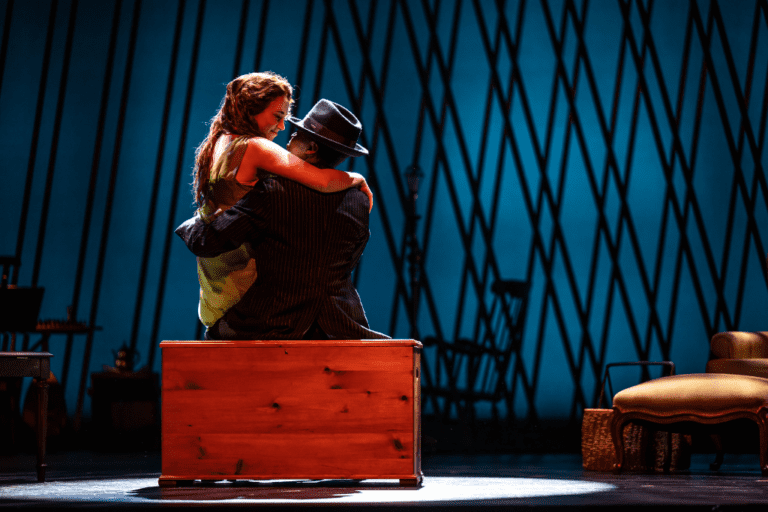The Role of the Actorvist
As an actor who has been part of a good number of “African themed” or “Afro-centric” productions for over a decade, I am deeply aware that roles like the one I have now in Refuge can really matter. Playing characters like Naijaboy in Shine Your Eye and Hyde in GLO, both part of Volcano Theatre’s The Africa Trilogy, challenged me and thus allowed me to challenge the audience. What would we do if we were in the shoes of our favourite African villains, internet scammers, and slum gangsters? These roles allow us all to strive for a fairer society and make us more diligent at seeking said fairness. But there’s also a pressure that that comes with taking on these roles.
Mebrahtu, the character I play in Refuge, is a fifty-something Eritrean-Canadian community leader in Halifax. He negotiates between his community and the wider world by acting as a translator for refugees. And when refugee Habtom commits the tragic act of suicide, Mebrahtu is the one who must handle the aftermath. Not only does he have to grieve and eulogize a relatively new friend on national radio, but he’s also faced with the task of giving an account of the man’s last days. He has the huge responsibility as a Canadian to make other Canadians understand Habtom’s plight, without seeking pity or inadvertently demonizing other “new Canadians,” especially those who share his Eritrean heritage. I’ve been a community leader myself, and I know the importance of giving Mebrahtu’s words careful treatment. Perhaps even more so, since they are mostly verbatim accounts of Habtom’s real-life story told in the award-winning CBC documentary Habtom’s Path.
Habtom’s story is not foreign to me and neither is his plight. However, after about a decade of activism up to and including leading protests on various front lines—like “Bring Back Our Girls” protests in Toronto—I have sadly noted what I call “front-line activist fatigue” among many young professionals. This fatigue has resulted in passive support of the various Black Lives Matter–type movements, which advocate for people of African descent everywhere but particularly here in North America. As a member of the AfriCanadian community, there is a pressure from my network to be involved. A friend recently cut ties with me after I expressed my front-line activist fatigue. She emphasized the need to consolidate all our efforts in “the struggle.”
For me, appearing in Refuge is me actively responding to my former friend’s challenge. My art speaks my social sensibilities. It involves me in the struggle, and I am able to “edutain” my fellow Canadians. In our everyday lives, we can protest issues that seem insurmountable to us as individuals. As an “actorvist,” I feel the need to respond to the urgency of the humanitarian issue of immigration. Globally, millions of people are seeking safe refuge from persecution in their respective homelands amidst the criminality of human trafficking, slavery, and worse. The role of Mebrahtu gives me a pulpit, however small, and is my own form of protest.

With Jason Weinberg in Refuge. Photo by John Lauener.
I am of African heritage, and it is (mostly younger) men of African descent who often find themselves on the wrong end of a “firearm incident,” whether involving the authorities or otherwise. Refuge’s story is particularly poignant for me, and the pressure of being involved in the telling of it is multilayered and urgent. I have been in Mebrahtu’s shoes. As the president of the Kenyan Community in Ontario from 2009 to 2011, I actively facilitated the aftermath of more than half a dozen deaths in the community. While most were accidental, or natural, one was particularly tragic: an apparent suicide of a relatively new member of the community. This member—may they rest in peace—was here as part of a professional exchange between Kenya and Canada.
I feel the weight of representing my Eritrean-Canadian brethren with dignity. And I wish to honour our Canadian commitment to the safety and wellbeing of the weakest among us by telling, as skillfully and tastefully as possible, this story of escape, survival, danger, and ultimately of an avoidable tragedy. I hope to tell this story as authentically as I can, without insulting or making a mockery of the experience of our millions of brothers and sisters who chose to plunge into the deepest, darkest, harshest, conditions that Mother Nature and humanity can conjure.
Thus, my faculties are sharp, my accent is on point, and my emotions close to the surface as I bring forth my Mebrahtu so that he can put pressure on YOU. I certainly feel the pressure.
The extreme conditions thousands of people face to make it to Canada from troubled parts of the world are not insurmountable for an informed, free, compassionate, and resourceful population. That’s “me” and “you,” Canada. We can’t stop wars across the globe (unless it’s our military doing the warring), but we can check our own prejudices in our daily interactions with new Canadians. We can speak up in the face of racism, and challenge our politicians to spend the money needed to make the world a better place for all. This is especially so for those desperate to escape death or inhuman conditions visited upon them by their leaders and the powerful among them. We can seek freedom for the oppressed in our international dealings and watch closely how our military power is flexed, and for whose benefit and to whose detriment.
Perhaps the challenge for us Canadians is to be more humane in dealing with people seeking refuge from disaster. For me, the first step is to commit to playing Mebrahtu in Refuge with all of the patience and nuance that the character deserves.









Comments